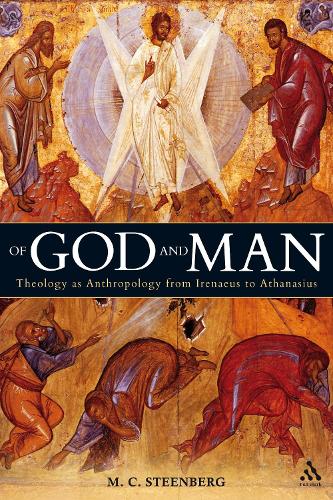
Of God and Man: Theology as Anthropology from Irenaeus to Athanasius
(Hardback)
Available Formats
Publishing Details
Of God and Man: Theology as Anthropology from Irenaeus to Athanasius
By (Author) Professor M. C. Steenberg
Bloomsbury Publishing PLC
T.& T.Clark Ltd
1st January 2009
United Kingdom
Classifications
Professional and Scholarly
Non Fiction
Theology
History of religion
230
Physical Properties
Hardback
224
Width 156mm, Height 234mm
490g
Description
Scholarship in early Christianity has long focused on themes of theological doctrine on the one hand, and anthropology on the other. Doctrinal study has generally concentrated on the rise of Trinitarian language and Christological questions, while anthropological studies explore early perceptions of human nature, sin and redemption. This has produced standard chronologies of doctrine, dividing early Christian history into distinct, if interrelated periods of history in the development of these views. Building on current scholarship, this volume re-assesses such an approach to early patristic study through a sustained investigation of anthropology and theology as a single project in the fathers. Taking Irenaeus of Lyons, Tertullian of Carthage, Cyril of Jerusalem and Athanasius of Alexandria as chief examples of the period, it explores how concentration on the human provides the context and lens through which doctrinal questions are articulated. Assessing theology as anthropology-as the approach to doctrines of God through understandings of the human-creative insight is gleaned into refined developments of trinitiarian thought far earlier than Nicaea, and advanced reflections on the divinity of the Holy Spirit long before Constantinople. The nature of humanity as 'in the image of God' takes on a fresh potency when it is approached not only as a window on the human, but the means by which the human reveals the nature of God.
Reviews
Of God and Man is a compelling treatment of a complex and fascinating period in Church History. Steenberg offers a lucid and perceptive theological treatment of the way early Christian discussions of man as 'image' influenced and furthered the church's maturingarticulation of the Trinity, a genuine theology of the Spirit, and a transforming vision of the human-divine relationship. Steenberg's study convincingly demonstrates that only as we perceive the importance of man as 'image' will we be able to fully appreciate the patristic theological enterprise as a whole.This is an important work for everyone wishing to come to grips with the way theology was conceived and articulated in the early Church.' Revd. Dr. Thomas G. Weinandy, O.F.M., Cap. Executive Director for the Secretariat for Doctrine, United States Conference of Catholic Bishops -- Revd Dr Thomas G. Weinandy
This is a profound book, exploring as no other the fact that the Christian God has revealed himself uniquely as a human being. Theology and anthropology are indeed intrinsically related, and this work explores that relationship during the crucial early centuries of Christian reflection. As Matthew Steenberg clearly shows, this theological work resulted not only in affirmations about God, but also a deepened understanding of ourselves, our existence, being, and life. Through a series of sensitively drawn sketches of particular and particularly important figures, Steenberg offers us much food for thought, both historical and contemporary.' V. Rev. Dr. John Behr, Dean, St Vladimir's Orthodox Theological Seminary, New York, U.S.A. -- Very Revd Dr John Behr
Author Bio
Matthew C. Steenberg, D.Phil in Theology, University of Oxford, is Professor of Theology and Head of Theology & Religious Studies at Leeds Trinity and All Saints. He has published numerous articles on Irenaeus and the second-century milieu, and is author of the forthcoming monograph from Brill, Irenaeus on Creation: The Cosmic Christ and the Saga of Redemption.
